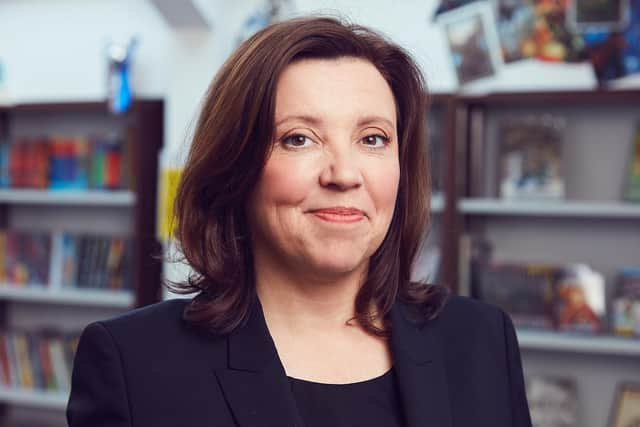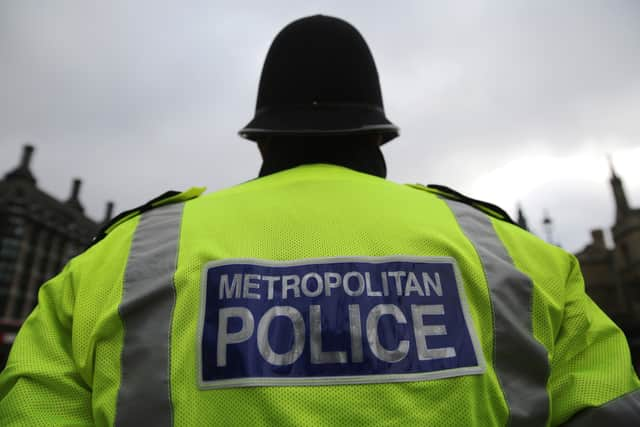Met Police subjected over 600 children to strip-searches in two years - what Dame Rachel de Souza has said
and live on Freeview channel 276
In a two-year period, over 600 children underwent “intrusive and traumatising” strip-searches by the Metropolitan Police.
Figures show Black boys were disproportionately targeted.
What does the data show?
Data obtained by Children’s Commissioner Dame Rachel de Souza revealed that between 2018 and 2020, some 650 children aged between 10-17 were strip-searched by Met Police officers.
Advertisement
Hide AdAdvertisement
Hide AdThe figures reveal that 95% of those stopped were boys, and 58% were described by the officer as being Black.
In almost a quarter (23%) of cases, strip-searches took place without an “appropriate adult” confirmed to have been present.


Report follows Child Q scandal
Dame Rachel requested the figures after the Child Q scandal came to light in March in which a 15-year-old schoolgirl was strip-searched by police while on her period after being wrongly suspected of carrying cannabis at school.
The search, by female Metropolitan Police officers, took place in 202. The girl was forced to expose her intimate body parts and remove her sanitary pad whilst on her period.
This search was conducted with no other adults present.
Advertisement
Hide AdAdvertisement
Hide AdA review conducted by City & Hackney Safeguarding Children Partnership (CHSCP) concluded the strip-search should never have happened, was unjustified and racism “was likely to have been an influencing factor”.
Four Metropolitan Police officers are being investigated for gross misconduct by the Independent Office for Police Conduct (IOPC) in connection with the incident.
Scotland Yard has apologised and said it “should never have happened”.
Since then, the IOPC has confirmed it is investigating four further strip-searches of children between early 2020 and 2022 and is considering whether to look into three more.
How have strip-search figures changed over the years?
Advertisement
Hide AdAdvertisement
Hide AdThe figures obtained by the Children’s Commissioner reveal the number of strip-searches on children increased each year, with 18% carried out in 2018, 36% in 2019 and 46% in 2020.
Two-thirds of these (70%) involved Black boys.
Overall, 53% of all the strip-searches resulted in no further action, which the Children’s Commissioner said indicates that they “may well not be justified or necessary in all cases”.
What has Dame Rachel de Souza said?
In her report, Dame Rachel said:“Today (8 August 2022), I am publishing Metropolitan Police data that I requested using my powers under the Children and Families Act 2014.
“Half of all strip-searches of children resulted in no further action taken, which calls into question whether these intrusive and traumatising searches were necessary at all.
Advertisement
Hide AdAdvertisement
Hide Ad“Between 2018 and 2020, 650 children were strip-searched – at a rate of nearly one a day in 2020.
“In some cases, these were children as young as 10 years old – a quarter of children searched were aged 15 or under.”
Dame Rachel spoke to ITV’s Good Morning Britain about her concerns on police handling. She said: “More worryingly, 25%, a quarter, of those had no appropriate adult there. That means no parent, no carer, no social worker, they were taken that the children are stopped and searched, not arrested, taken either to a police station or to home, one in five, we don’t even know where they were taken and subject to an intimate search.
“That 25%, without an appropriate adult, is really worrying. It’s a very traumatic experience and it needs to stop. We need an appropriate adult there.”
Advertisement
Hide AdAdvertisement
Hide AdShe is also “extremely concerned” at the ethnic disproportionality they reveal, with ethnicity identified as a key factor in Child Q’s ordeal.
She said: “I am not reassured that what happened to Child Q was an isolated issue, but instead believe it may be a particularly concerning example of a more systemic problem around child protection within the Metropolitan Police.
“I remain unconvinced that the Metropolitan Police is consistently considering children’s welfare and wellbeing.”
The data has been submitted to Baroness Louise Casey, who is carrying out a review into standards at the Met.
Advertisement
Hide AdAdvertisement
Hide AdThe Children’s Commissioner’s team will request comparable data from all police forces across England.


How has the Met responded?
A Metropolitan Police spokesman said: “The Metropolitan Police is progressing at pace work to ensure children subject to intrusive searches are dealt with appropriately and respectfully. We recognise the significant impact such searches can have.
“We have already made changes and continue to work hard to balance the policing need for this type of search with the considerable impact it can have on young people.
“We have ensured our officers and staff have a refreshed understanding of the policy for conducting a ‘further search’, particularly around the requirement for an appropriate adult to be present.
Advertisement
Hide AdAdvertisement
Hide Ad“We have also given officers advice around dealing with schools, ensuring that children are treated as children and considering safeguarding for those under 18.
“More widely we have reviewed the policy for ‘further searches’ for those aged under 18. This is to assure ourselves the policy is appropriate and also that it recognises the fact a child in these circumstances may well be a vulnerable victim of exploitation by others involved in gangs, county lines and drug dealing.”
Describing changes made by the Met as a “good start”, Dame Rachel said a lot of change will be needed to keep children safe.
